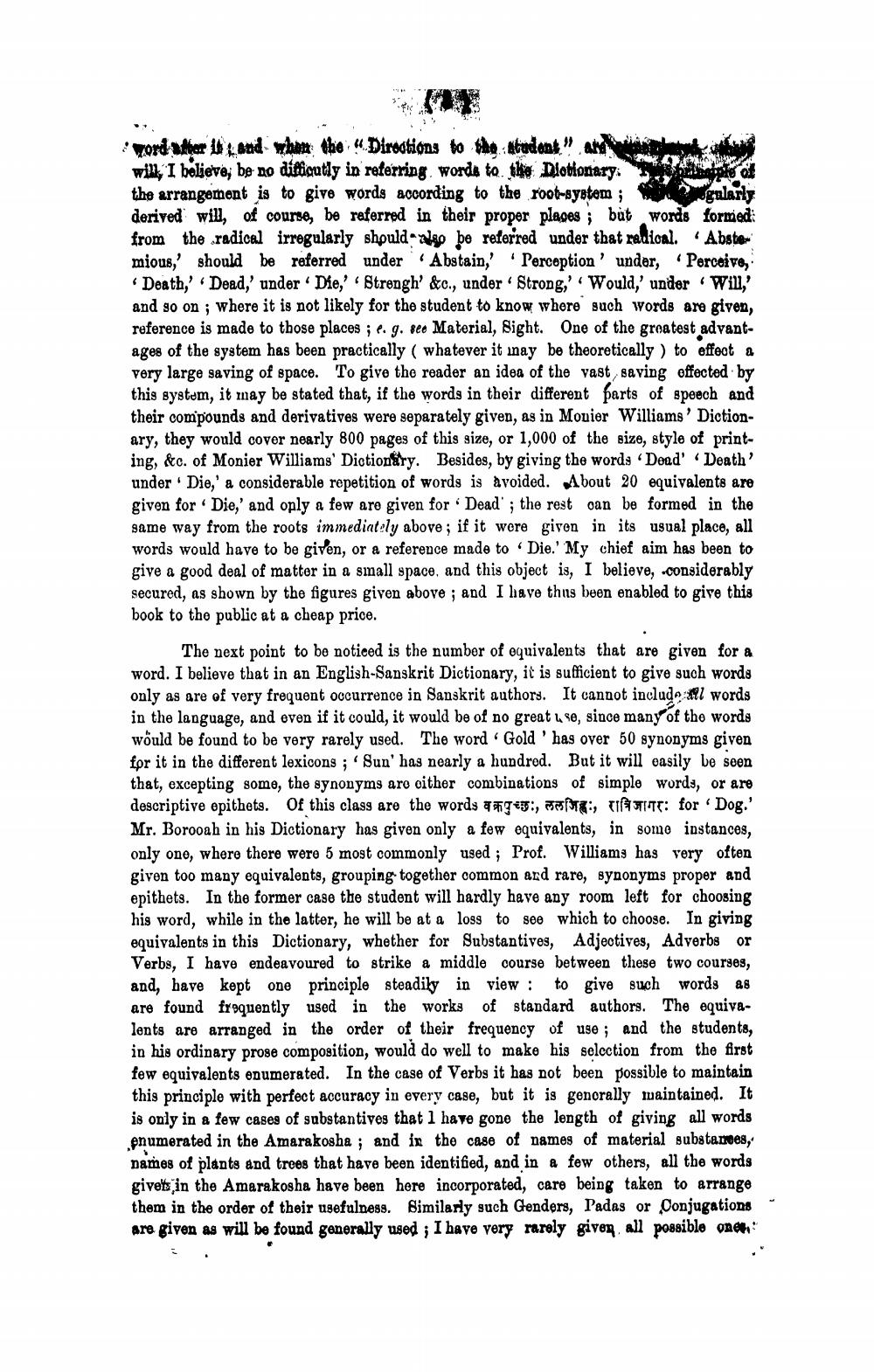Book Title: English Sanskrit Dictionary Author(s): Vaman Shivram Apte Publisher: Radhabai Atmaram Sagoon View full book textPage 8
________________ word en die l and what the Directions to the student" an under en litenkin will, I believaj bo no diftigutly in referring words to the Dlotionary: to di the arrangement is to give words according to the root-system; • 1000-Sysvem; gularly derived wil, of course, be referred in their proper plages ; but words formed from the radical irregularly should also be referred under that radical. Abste mious,' should be referred under Abstain,' Perception' under, Perceive, Death,'Dead,' under Die, Strengh' &c., under Strong,' Would,' under "Will, and go on ; where it is not likely for the student to know where such words are given, reference is made to those places ; e. g. see Material, Sight. One of the greatest advantages of the system has been practically ( whatever it inay be theoretically ) to effect a very large saving of space. To give the reader an idea of the vast saving effected by this system, it may be stated that, if the words in their different parts of speech and their compounds and derivatives were separately given, as in Mouier Williams' Dictionary, they would cover nearly 800 pages of this size, or 1,000 of the size, style of printing, &c. of Monier Williams' Dictionary. Besides, by giving the words Dead' Death' under. Die,' a considerable repetition of words is avoided. About 20 equivalents are given for Die,' and oply a few are given for Dead'; the rest oan be formed in the same way from the roots immediately above ; if it were given in its usual place, all words would have to be given, or a reference made to Die.' My chief aim has been to give a good deal of matter in a small space, and this object is, I believe, .considerably secured, as shown by the figures given above ; and I have thus been enabled to give this book to the public at a cheap price. The next point to be noticed is the number of equivalents that are given for a word. I believe that in an English-Sanskrit Dictionary, it is sufficient to give such words only as are of very frequent occurrence in Sanskrit authors. It cannot include all words in the language, and even if it could, it would be of no great uso, since many of the words would be found to be very rarely used. The word Gold' has over 50 synonyms given for it in the different lexicons ; 'Sun' has nearly a hundred. But it will easily be seen that, excepting some, the synonyms are either combinations of simple words, or are descriptive epithets. Of this class are the words 75€:, Fafiki, T ITT: for Dog.' Mr. Borooah in his Dictionary has given only a few equivalents, in some instances, only one, where there were 5 most commonly used ; Prof. Williams has very often given too many equivalents, grouping together common and rare, synonyms proper and epithets. In the former case the student will hardly have any room left for choosing his word, while in the latter, he will be at a loss to see which to choose. In giving equivalents in this Dictionary, whether for Substantives, Adjectives, Adverbs or Verbs, I have endeavoured to strike a middle course between these two courses, and, have kept one principle steadily in view : to give such words as are found frequently used in the works of standard authors. The equivalents are arranged in the order of their frequency of use; and the students, in his ordinary prose composition, would do well to make his selection from the first few equivalents enumerated. In the case of Verbs it has not been possible to maintain this principle with perfect accuracy in every case, but it is generally maintained. It is only in a few cases of substantives that I have gone the length of giving all words enumerated in the Amarakosha, and in the case of names of material substamees, names of plants and trees that have been identified, and in a few others, all the words givets in the Amarakosha have been here incorporated, care being taken to arrange them in the order of their usefulness. Similarly such Genders, Padas or Conjugations - are given as will be found generally used; I have very rarely given, all possible one!Page Navigation
1 ... 6 7 8 9 10 11 12 13 14 15 16 17 18 19 20 21 22 23 24 25 26 27 28 29 30 31 32 33 34 35 36 37 38 39 40 41 42 43 44 45 46 47 48 49 50 51 52 53 54 55 56 57 58 59 60 61 62 63 64 65 66 67 68 69 70 71 72 73 74 75 76 77 78 79 80 81 82 ... 474
